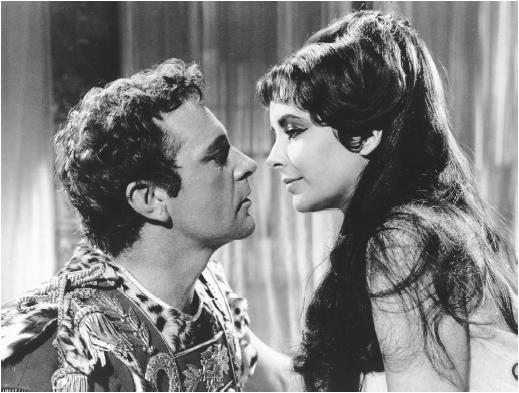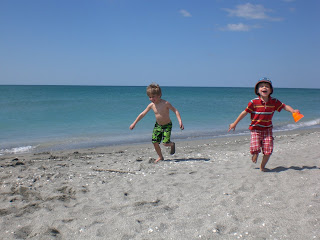Cleopatra OverviewIf you still lie awake at night thinking about the series I did a couple of years back on the legend and literary legacy of Joan of Arc (
Part 1,
Part 2, and
Part 3), you are in luck, for now I am going to take on, only with that much more blogging experience, her primary feminine rival for supremacy in the Western artistic imagination, the fantastic and doomed last queen of Ptolemiac Egypt.

I have started this paragraph four or five times and each time completely contradicted one of the assertions I had made in the draft before. As far as posterity is concerned Cleopatra of course is all about one thing--i.e., not her ideas about effective governance--that I am clear on, though where to go with my story once I have satisfied myself on that matter I am finding more difficult to do than it is with the likes of Joan of Arc. Joan talked to God, and took on the persona of a divinely inspired figure, which is easy to prattle on about. One may not understand it, but one has an idea of what its form would probably be like if he did understand it, and that without a heavy blow to one's self-esteem. Cleopatra, in her finest manifestation, took on the persona of an actual goddess with no pretension to any other but earthly concerns, and in a convincing and seductive manner. This should be a much more recognizable and readily comprehended human experience, even in our much-sanitized modern version of life. I am only comfortable trafficking in abstractions however. Coming thus near to such circumstances of real existence that call out for acknowledgement only causes my mind to tremble.
I have the fortune, good I think, to have not seen any Cleopatra movies such as may have influenced my impressions of her too strongly before reading the more classical literary material. The most salient impressions made upon me from the literary accounts are her intellectual superiority--in modern terms we are talking multiple Rhodes/Fulbright scholarship material, worshipped by all her professors as the penultimate dream student of their career; her apparently total comfort with employing sex full-on as a weapon in her political and social maneuvering (maneuver, by the way, is on my list of the hardest common words to remember the spelling of in the English language; I have to look it up every time), her hasty flight in the decisive battle of Actium, which incredibly drove Antony after her, abandoning the entire Roman Empire to the unflappable young Octavian (whom Cleopatra could not stir to wild desire--my theory is that, Octavian being younger, and of a more ruthlessly pragmatic generation besides--generations decidedly having temperaments--the magic of her wiles had prematurely run their course), and in the end her ultrafeminine Madame Bovary-like determination to commit suicide in as painless and unbloody and undisfiguring a manner as possible. I will elaborate on some of these points below.
1. The main account I am aware of of how brilliant she was, in the true tradition of the heir of a great high culture in its mature and declining stages (in her case, Greek), which produces a staggering overall sophistication of both mind and person, as well as sensual awareness, comfort, and ultimately, heedlessness, in anyone who is raised in such, is from Plutarch: "...her actual beauty, it is said, was not in itself so remarkable that none could be compared with her, or that no one could see her without being struck by it, but the contact of her presence, if you lived with her, was irresistible; the attraction of her person, joining with the charm of her conversation, and the character that attended all she said or did, was something bewitching. It was a pleasure merely to hear the sound of her voice, with which, like an instrument of many strings, she could pass from one language to another; so that there were few of the barbarian nations that she answered by an interepreter; to most of them she spoke herself, as to the Aethiopians, Troglodytes, Hebrews, Arabians, Syrians, Medes, Parthians, and many others, whose language she had learnt..." (
Life of Antony).
2. Her arrival in a barge in the person of Venus to meet Antony, and the spectacular contrivances of lights and settings for his entertainment was one of the top 100--perhaps even top 50, or top 25, if episodes from the Bible are not included--magical moments of all antiquity for sensitive and imaginative types in all ages and in all countries. After this, Antony, Plutarch noted, "...was very desirous to outdo her as well in magnificence as contrivance; but he found he was altogether beaten in both, and was so well convinced of it that he was himself the first to jest and mock at his poverty of wit and his rustic awkwardness." Whether Cleopatra was "beautiful" or not is one of the silliest debates that has ever existed in the history of knowledge. If the stories as they have been passed down through history have any truth at all in them, then unless we are talking about people who know nothing of what makes men fall into sexual infatuation with women, which is that some quality in the woman is strongly persuading them that they are detecting some beauty so rare and extraordinary in the object of their desire that it will be as death to them, render their entire lives pointless not to possess it, it is fairly obvious that she was beautiful, and an analysis of the particular fineness of her features, skin texture, etc, is not relevant. I think there is a tendency in our time to imagine that men, especially powerful ones, in the distant past, were able to take advantage of women beneath them in rank whenever they felt like it, and that therefore the type of love-infatuation that we associate mainly with desperation, men who cannot get a woman to come within twenty feet of them and so forth, could not have been possible. Caesar and Antony had legions of slaves and conquered women and eager and willing daughters of the higher ranks of the plebians available at the twitch of a finger. Why would they waste valuable months to loll in bed with Cleopatra, if not for some geopolitical, or economic motive, which is our default
real explanation for everything important that has ever occurred in human history? Egypt was not geopolitically insignificant, and yes, Rome was interested in taking it over--at that point they had just taken over a hunk of Britain that was thousands of miles from Rome and populated by what were by the standards of the day quasi-savages, so what weren't they interested in taking over? And yes, I know there were large deposits of tin there--but that it happened to be (literally) where the action was for numerous members of the Roman elite between around 50 and 30 B.C. seems to have been largely attributable to Cleopatra. Once she died the vacations and length of visits to Alexandria by emperors and leading generals seem to have dropped off dramatically, though the city still remained a dynamic intellectual center, particularly in mathematics and astronomy, and one assumes still housed a decent population of sophisticated, beautiful, culturally Grecian babes.
3. Even the horrors of battle in World Wars I and II somehow do not quite compare in the reading to accounts of ancient Greek and Roman warfare. Perhaps this is because the ancients were more effective writers, but I think too that the purer impression of the brutality of nature that is in them--the more personalized slaughter, the circling vultures, the swirling dust, the images of steel turning in a hapless body, the vastness of the plains and seas and the comparative...scale of human population and enterprise--may act upon the imagination more vividly than the often numbing and rootless, disembodied and anonymous descriptions of modern mechanized carnage. In any case it is not hard to imagine that a woman so highly refined as Cleopatra might not have much appetite for an all out Roman-style bloodbath, hence her hasty Flight from the decisive fight at Actium. It is reiterated in all the sources that her greatest dread, (and on the other side, the fervent desire of Young Caesar, i.e., Octavian) was to be taken alive and paraded in triumph through the streets of Rome. I suppose it is an indication of how thoroughly developed her nobility was that such an indignity was truly intolerable, and death welcomed, however reluctantly. Reading through Plutarch, and to a lesser extent Diodorus Siculus (whose sections dealing with this era of Roman history were largely lost), many triumphs are recounted, but it was a very rare occasion that any conquered monarch was captured and paraded alive through Rome.
I can only recall one major one, the king of Macedonia when that once-vital nation collapsed before the Roman onslaught in 146 B.C. I believe his name was Perseus. Needless to say, most of his commentators were astounded that he neglected to fall on his sword and submitted to this ultimate disgrace. The account of his demeanor both in his defense of his country, his capture and his parade through the streets of Rome depicted a very indifferent, almost obtuse man who spoke little, ate such meals as were provided him as if there were nothing remarkable about his situation, and otherwise gave little impression of being terribly upset about the fate of his country, certainly, and even, by normal human standards, himself.
4. Cleopatra's suicide by immuring herself in a tower with a smuggled basket of poisonous asps was a stroke of absolute genius for her future life as one of history's legendary women. I find myself looking forward to seeing how the writer/artist/filmmaker presents that scene in every interpretation that comes up. What a way to go, and what a statement about the madness of this particular existence that is a human's lot.

The search for Antony and Cleopatra's tomb, which it is apparently believed by some respectable scholars is still lying out there somewhere in a state to be found and identified, is one of the major ongoing quests in the ranks of big time archaeology. Actually there was some
excitement on that front recently, but given that the story seems to have died--I would think it would have been a bigger story than this if it had really turned out to be the tomb--I am guessing that there must have been some conclusive evidence that it was
not the tomb. Hopefully, the search will go on.
I am not ordinarily a great fan of the legendary celebrity and beauty Elizabeth Taylor, whose picture I have obviously put up at the top of this page, but I liked the look she has going on with her hair, which was a very common way for women to wear their hair when being photographed in the 1960s--frequently in Playboy type publications, it is true, but the French went in for this style, Brigitte Bardot, et al, and my own mother used to wear her hair like this too in her salad days. You hardly ever see anyone wearing their hair like this anymore. Alpha men love it. All those macho film directors and rock stars and cult writers of the 60s, who knew how to handle and turn on beautiful women in ways we don't even believe exist anymore had girlfriends with hair like this. It was the way to be sexy then, and I must say, there was something in it.
 Having only seen Ingrid Bergman in Casablance and a later movie I can't remember the title of in which she plays a missionary in China, I had never noticed before how big she was. In the clip above she is built like a power forward.
Having only seen Ingrid Bergman in Casablance and a later movie I can't remember the title of in which she plays a missionary in China, I had never noticed before how big she was. In the clip above she is built like a power forward. 










 Given the poem's evident place in the current intellectual life of the nation as a high school staple, I am not going to indulge in any earnest analysis of it. You may assume I, a man of wide reading and experience of the world, understand its insights more than adequately. Of course when I tried to answer the two questions on the poem in the GRE test guide which is the source of my reading list I missed them both. The first one was: "All of the following oppositions or contrasts are present in the poem EXCEPT" (A) applause/silence (B) scientific analysis/mysticism (C) mathematical certainty/error (D) light/dark (E) group/individual. The correct answer was (C). I chose (D), not because I actually thought it was right either--I guess the question involved too much complicated thinking for me--but because I figured that contrast was too obvious/ mundane to merit serious consideration in a masterwork of poetry. The second (of course there had to be a second) was: "Which of the following words has more than one meaning in context?" (A) Figures (line 2) (B) Measure (line 3) (C) Applause (line 4) (D) Mystical (line 7) (E) Perfect (line 8) Th answer was (E). I think I refused to play the game at this point, like the cats who refuse to push levers and demonstrate logical thinking skills to receive food in science studies as mice and dogs do. One could interpret any of them as having a double meaning, except applause. I thought both questions were rather weak, really. I certainly hope the reason for my having to spend most of my life warehoused at a great remove from any kind of living society of learning and litterateurs is not due to these kind of subtle, teeny-tiny little faux pas. I'm sure it is not, is in most part due to failings of much vaster and probably insuperable import with regard to understanding what art, thought, etc, and their relation to the vital life signify. But still, the small failures constititute a substantial part of the big.
Given the poem's evident place in the current intellectual life of the nation as a high school staple, I am not going to indulge in any earnest analysis of it. You may assume I, a man of wide reading and experience of the world, understand its insights more than adequately. Of course when I tried to answer the two questions on the poem in the GRE test guide which is the source of my reading list I missed them both. The first one was: "All of the following oppositions or contrasts are present in the poem EXCEPT" (A) applause/silence (B) scientific analysis/mysticism (C) mathematical certainty/error (D) light/dark (E) group/individual. The correct answer was (C). I chose (D), not because I actually thought it was right either--I guess the question involved too much complicated thinking for me--but because I figured that contrast was too obvious/ mundane to merit serious consideration in a masterwork of poetry. The second (of course there had to be a second) was: "Which of the following words has more than one meaning in context?" (A) Figures (line 2) (B) Measure (line 3) (C) Applause (line 4) (D) Mystical (line 7) (E) Perfect (line 8) Th answer was (E). I think I refused to play the game at this point, like the cats who refuse to push levers and demonstrate logical thinking skills to receive food in science studies as mice and dogs do. One could interpret any of them as having a double meaning, except applause. I thought both questions were rather weak, really. I certainly hope the reason for my having to spend most of my life warehoused at a great remove from any kind of living society of learning and litterateurs is not due to these kind of subtle, teeny-tiny little faux pas. I'm sure it is not, is in most part due to failings of much vaster and probably insuperable import with regard to understanding what art, thought, etc, and their relation to the vital life signify. But still, the small failures constititute a substantial part of the big.


